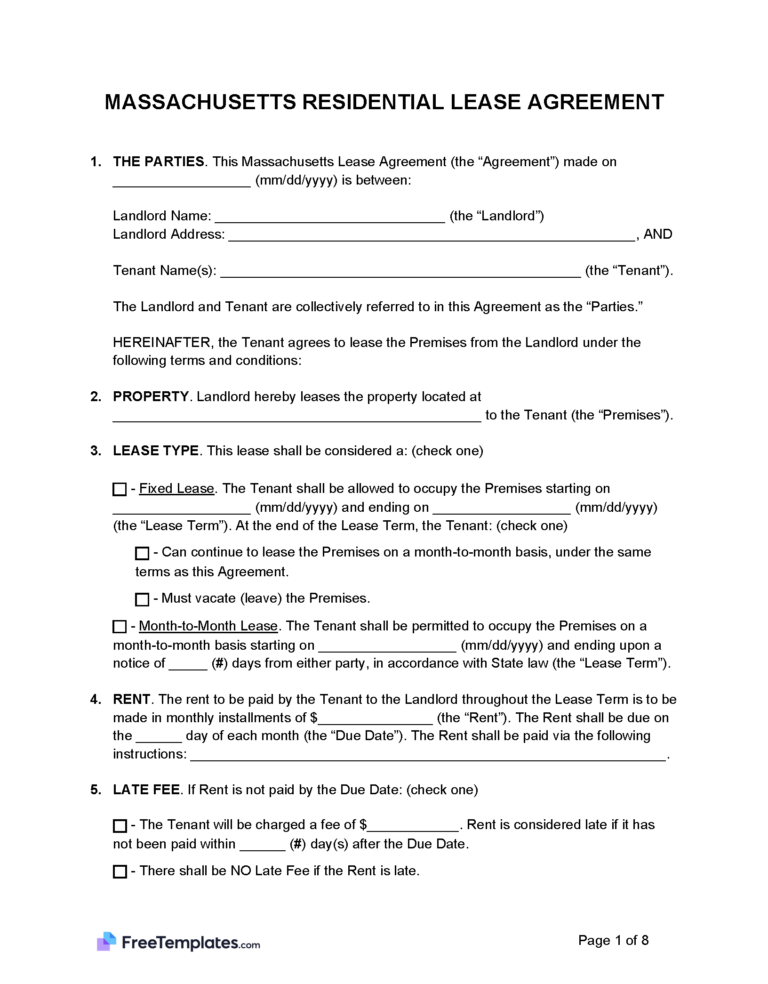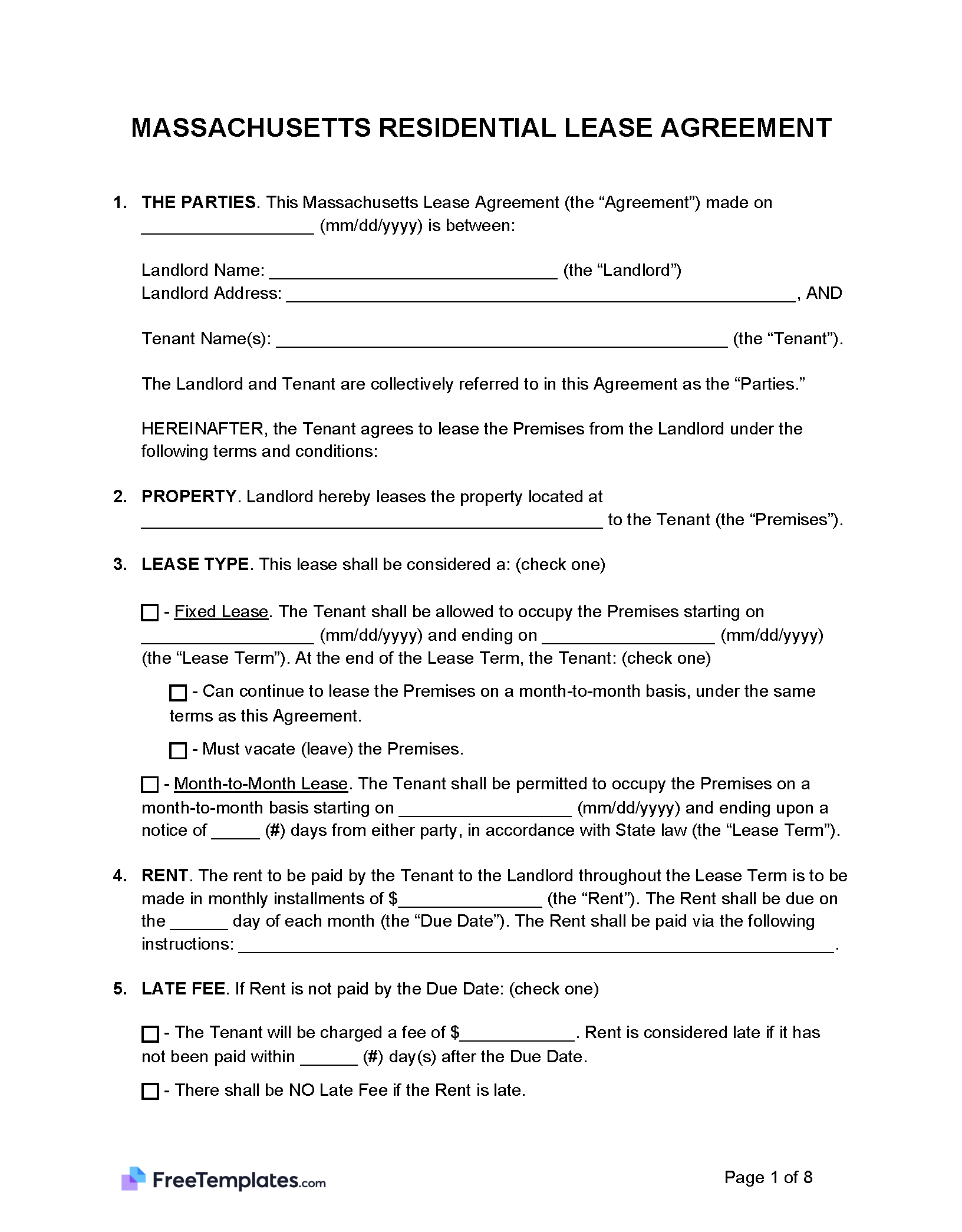By Type (6)
| Standard Lease Agreement – A fixed-term contract between a landlord and someone who wants to rent a residential property. The contract is typically for 1 year. |
| Commercial Lease Agreement – A legal document between a landlord and a business. The term is typically longer than a residential lease. |
| Month-to-Month Lease Agreement – A tenancy at-will is a flexible short-term rental option that can be oral or written; however, the landlord or the tenant requires notice of 30 days or more to end the contract. |
| Rent-to-Own Agreement – An arrangement in which the renter can purchase the property from the owner after a disclosed amount of time renting the property. |
| Roommate Agreement – A legally binding document between individuals living together. It outlines each party’s responsibilities and helps promote a harmonious living environment. |
| Sublease Agreement – With the landlord’s approval, the tenant can rent all or part of the rental unit to a new tenant. During this time, the original tenant will still be legally bound to the landlord by their lease agreement and is responsible for rent payments, and making sure the terms and conditions continue to be followed. |
Disclosures (5)
Fire Insurance – The law in Massachusetts requires landlords to provide information about the property’s fire insurance within 15 days of being requested. The information must include the insurance company’s name, the coverage amount, and the recipient of any insurance payment for a loss. (Source: M.G.L. c. 186, § 21)
Statement of Condition – If the landlord collects a security deposit, the landlord should give the tenant a “Statement of Condition” within 10 days of either the tenancy beginning or upon receipt of the security deposits, whichever is later. This document states the condition of the property and any pre-existing damage. The tenant has 15 days to add to or make changes to the statement.
Last Month’s Rent Receipt – If the landlord collects the last month’s rent at the beginning of the lease, the landlord must provide a signed receipt stating the amount paid, date, description, landlord’s name, tenant’s name, and the name of the person who received the payment. Every year, and when the lease ends, the landlord must give any interest earned. (Source: The Attorney General’s Guide to Landlord and Tenant Rights)
Security Deposit Receipt – Any lessor receiving a security deposit must provide a receipt stating the amount, name of the person receiving it, the landlord, the date received, and a description of the rental premises. The receiver must sign the receipt. (Source: M.G.L. c. 186, § 15B(2)(b)) The landlord must give this receipt to the tenant within 30 days. (Source: M.G.L. c. 186, § 15B(3)(a))
Lead-Based Paint Disclosure – If the property was built before 1978, the landlord and the tenant must sign and retain the federal Tenant Lead Law Notification and Tenant Certification. These forms inform the tenant of the risks and presence of lead-based paint in the rental premises.
Security Deposit
Maximum Amount – The tenant’s security deposit cannot exceed more than 1 month’s rent. (Source: M.G.L. c. 186, § 21(1)(b))
Collecting Interest – Any security deposit collected must be held in a separate interest-bearing account located within the Commonwealth of Massachusetts. The account should be protected against foreclosure or bankruptcy and should be transferrable to a new property owner. (Source: M.G.L. c. 186, § 15B(3)(a))
Paying Interest – If the landlord holds the security deposit for 1 year or longer, they must pay the tenant an interest rate of 5% or less received from the bank. This interest should be paid annually or within 30 days of the lease ending. The payment should include a financial statement listing the bank, address, deposit amount, account number, and interest payable. If applicable, the landlord or tenant can also deduct the interest amount due from the next rent payment. (Source: M.G.L. c. 186, § 15B(3)(b))
Returning to Tenant – Landlords have 30 days after the lease ends to return the security deposit to the tenant. Deductions for unpaid rent, water charges, real estate tax increases, or damages beyond normal wear and tear may be taken. If deductions are made, landlords must provide a list of each item’s costs. (Source: M.G.L. c. 186, § 21(4))
Landlord Access
General Access – The landlord must only enter the rental premises for specific reasons, such as inspections, repairs, or showing the property to potential buyers or renters. Within 30 days of the lease ending, the landlord can also enter the property to assess for damage and potential deductions from the security deposit. (Source: M.G.L. c. 186, § 15B(1)(a))
Emergency Access – The Commonwealth does not regulate when a landlord can enter the rental unit under emergency scenarios.
Paying Rent
Grace Period – The landlord must wait 30 days before collecting any penalty for late rent. (Source: M.G.L. c. 186, § 21(1)(c))
Interest on Late Payment – After 30 days, the landlord can start collecting interest on the late rent or begin eviction proceedings. (Source: M.G.L. c. 186, § 21(1)(c))
Maximum Late Fee – Massachusetts does not set a limit on how much a landlord can charge for a late fee; however, the amount must be disclosed in the lease to avoid disputes.
Returned Checks (NSF) – For payments of $2,500 or less, the landlord can collect $25 for bounced checks. For dishonored payments of $2,500 or more, the landlord can assess a 1% fee. (Source: M.G.L. c. 60, § 57A)
Reasons for Eviction (2)
Non-Payment of Rent – If the tenant is 30 days late in paying rent, the landlord can issue a 14-day Notice to Quit notice, giving them 2 weeks to move out of the rental unit or pay the full amount due, plus interest and the landlord’s costs of filing the eviction notice. (Source: M.G.L. c. 186, § 11)
Non-Compliance – For reasons other than non-payment, such as damages, unauthorized subtenants, or violating other lease terms, the landlord must give the tenant notice to vacate the property before filing an eviction notice with the court. The amount of time of the notice is not set by law and may vary by lease and must be disclosed in the lease.

